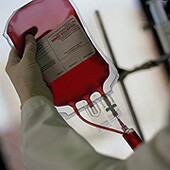- Could Artificial Sweeteners Be Aging the Brain Faster?
- Techniques for Soothing Your Nervous System
- Does the Water in Your House Smell Funny? Here’s Why
- Can a Daily Dose of Apple Cider Vinegar Actually Aid Weight Loss?
- 6 Health Beverages That Can Actually Spike Your Blood Sugar
- Treatment Options for Social Anxiety Disorder
- Understanding the Connection Between Anxiety and Depression
- How Daily Prunes Can Influence Cholesterol and Inflammation
- When to Take B12 for Better Absorption and Energy
- Epsom Salts: Health Benefits and Uses
Whole Blood Best for Youngest Heart Surgery Patients: Study


Children undergoing heart surgery do better when they get fresh whole blood from single donors instead of “component blood” from multiple donors, new research suggests.
But fresh whole blood isn’t typically available for pediatric heart surgery patients, said study leader Dr. David Jobes, of the Children’s Hospital of Philadelphia and Perelman School of Medicine at the University of Pennsylvania in Philadelphia.
“We hope that our research helps to re-examine current blood storage practice and make whole blood more readily available for pediatric patients,” Jobes added.
The findings are published in the May issue of Annals of Thoracic Surgery.
Patients given blood or blood components can experience allergic reactions or serious complications such as lung injury and infectious disease, the researchers noted.
“The risk for disease transmission in pediatric patients is essentially the same as the risk for adults, but may be more costly over the long term because infants and young children may live longer with chronic illness stemming from transfusion,” Jobes said in a journal news release.
He and his colleagues looked at a Children’s Hospital program that aimed to reduce the need for blood transfusion by routinely providing two units of fresh whole blood to elective heart surgery patients under age 2. Fresh whole blood hasn’t been divided into separate parts like plasma and platelets.
The study tracked more than 4,100 patients, most of whom received fresh whole blood, from 1995 to 2010. Their median age — meaning half older, half younger — was 94 days.
The youngest patients who had complex heart surgery procedures were exposed to the highest number of donors, while older patients who had simpler heart surgery procedures were exposed to the fewest number of donors, the researchers said.
More donors can spell more trouble for patients.
“Many congenital heart conditions require multiple surgeries over a lifetime necessitating additional transfusion, and previous exposure can cause cross-match incompatibility, reducing the availability of suitable blood for transfusion and cause problems later if heart transplantation is necessary,” Jobes said.
More information
For more about pediatric heart surgery, visit the U.S. National Library of Medicine.
Source: HealthDay
Copyright © 2026 HealthDay. All rights reserved.










